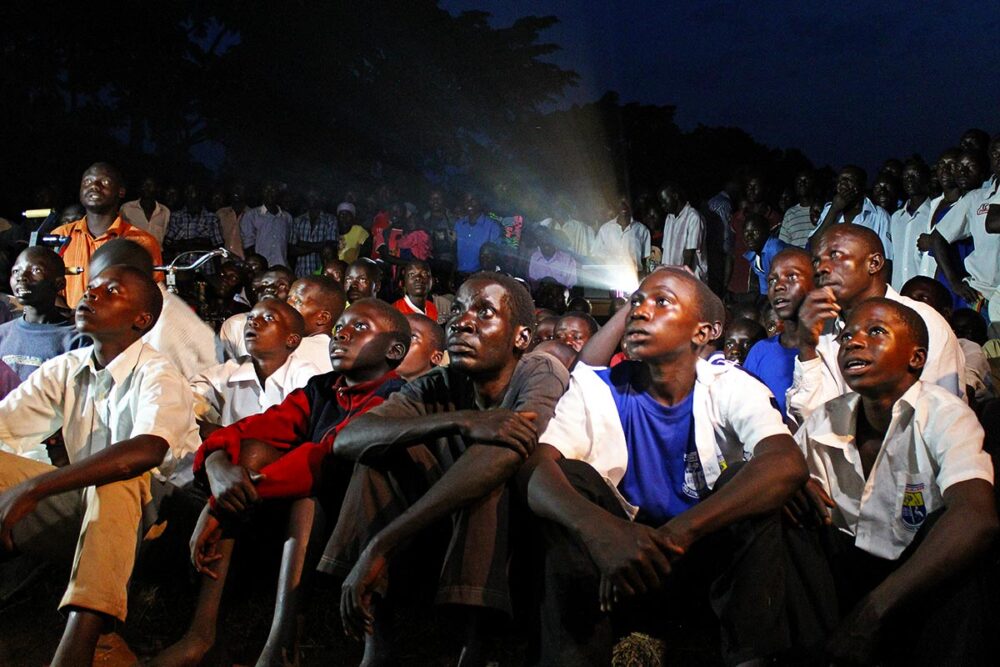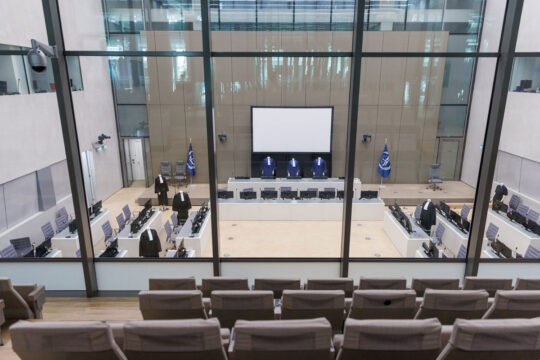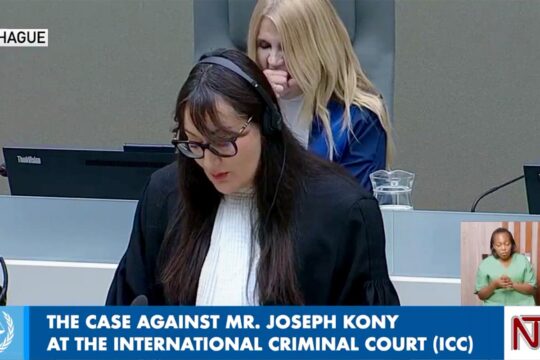The case against Joseph Kony, leader of a Ugandan rebel group the Lord’s Resistance Army (LRA) has been languishing in a dusty corner of the Hague for the past twenty years. But it now takes centre stage for a short week, as the current prosecutor of the International Criminal Court (ICC) has decided to make use of one of the court’s ‘just-in-case’ provisions – article 61 para 2 of the Rome Statute – to hear the case against Kony without his presence.
The court’s detention unit is not bulging with arrestees; later this month the former president of the Philippines will have his time in court to confirm the charges against him, and in Germany a Libyan detainee is waiting to have his transfer to The Hague confirmed. But there are no other suspects lined up ready to prime the three courtrooms’ pumps.
A dry white season
In this context of trial starvation, how does a court prove to the world that it is still relevant – when it is also under sanction from the United States, facing cyber-attacks from unknown forces and where states – nominally its supporters – are proving reluctant to arrest suspects?
When the current prosecutor took over in 2021, together with his two deputies, the emphasis has been on generating arrest warrants in the two situations delegated to the court by the United Nations Security Council – Libya and Darfur Sudan. Then, the invasion of Ukraine by Russia and Israel’s war in Gaza have both led to high stakes manoeuvring for the court and arrest warrants that have no prospects of being executed in the current political climate. In both Afghanistan and Myanmar, the office of the prosecutor has targeted very high-level suspects, thereby continuing to expand beyond the original focus of the court on conflicts in Africa.
Uganda’s rebel war in the north has been over for many years. It was one of the early ‘wins’ for the ICC back in 2004 when president Yoweri Museveni met prosecutor Moreno Ocampo in a hotel in London and asked for ICC intervention. But the most important target, the leader of the LRA, Kony, later disappeared into the dense forests bordering Uganda. His arrest warrant was issued some twenty years ago. He was not arrested even when a US force was operating in the region.
“Ultimately, the ICC had to do something to show that the arrest warrant was still relevant,” says Micheal Scharf, former Dean of Case Western Reserve University School of Law, and president of the American branch of the International Law Association. “As an institution, they have to survive; the ICC is going through a hard period with sanctions, and states that ignore their obligations, so they need cases that they can deliver,” adds professor of criminology at Groningen University Alette Smeulers. But beyond that, Scharf believes: “It’s important for the world to say, no, this is not just a Uganda problem, this was a worldwide international criminal. And for the sake of humanity, he needs to be brought to justice”.
“Fear that victims’ voices may never be heard”
Where did this idea of confirming the charges without the defendant come from? Back at the beginning of the establishment of the International Criminal Tribunal for the former Yugoslavia (ICTY) in the 1990s the judges strengthened Rule 61 in their statute – i.e. public reconfirmation of charges without the accused presence. It was a period in which there was a rising sense of “desperation”, says Diane Orentlicher, law professor emerita at American University and author of a book about the ICTY, born out of the “frustration” that “states were not cooperating in helping to apprehend suspects”.
The tribunal, she adds, “wanted to show that it wasn’t impotent – and say, ‘we’re doing something, we are not helpless in the face of States’ inaction.’ Some also hoped that Rule 61 hearings might help pressure the UN Security Council, which had created the Tribunal, to act”. But the procedure provoked “robust debate,” says Orentlicher. “Some worried it risked violating defendants’ rights; others wondered if it might backfire, taking pressure off States to arrest suspects. Then, as States started to arrest suspects, and the court became busy conducting trials, Rule 61 faded into insignificance.
She stresses also that it was a different issue to that of Kony. That he has never been arrested is “not for lack of vigorous effort”, including a multi-million-dollar reward for his capture and the deployment of a special unit to track him. Rather, she suggests that “with no reported sightings of him in a while, there’s a fear that victims’ voices may never be heard” and “if the hearing succeeds in reinvigorating efforts to arrest Kony, that would be a success”.
Setting a precedent?
“Right now, it’s not a politically sensitive case,” says Smeulers. “Everyone would agree that Kony is a perpetrator. He has lost most of his power, and he’s clearly a guy who did horrendous things, especially against children”.
Scharf suggests “with the passage of time, it was pretty much a foregone conclusion that [the office of the prosecutor] would try this, because you don’t want to allow this case to be forgotten”. But he also sees the speculation that has already started about whether “the ICC prosecution are teeing themselves up for future cases”. Scharf points to the long-standing warrants against former Libyan dictator’s son Saif Qaddafi and that against former president of Sudan Omar al-Bashir. “Both of those are similar to the Kony case because of the length of time. The standard is that the individual has to be someone who cannot be found,” he says.
However, when it comes to any potential procedures concerning the court’s most high-profile suspects – Russian President Vladimir Putin or Israelian Prime Minister Benjamin Netanyahu – he cautions that it is much less likely: “We know where they are. They’re sitting in their office in the Kremlin or Jerusalem. But depending on how you define ‘not to be found’, it could be that this process could be used against them”.
In that sense, “the Kony confirmation in absentia is a trial run in an important precedent for these other bigger cases,” says Scharf.
Crimes against children, women and girls
Kony faces 39 charges for his alleged role in the LRA in ordering the killing and mistreatment of civilians, for making “strategic decisions regarding the manner, intensity and focus of attacks against civilians”, for maintaining “the system of abductions during the charged period, for issu[ing] orders to all LRA to abduct civilians”, and for “devis[ing] and enforc[ing] the LRA rules for the mistreatment of women and girls”.
He is also accused of personal responsibility for “using children as escorts and abducted women and girls to act as domestic servants and as forced conjugal partners” and for controlling his fellow LRA commanders through a system of rewards and threats. The document containing the charges describes attacks during the early 2000s on schools, and multiple internal displacement camps. He is charged for attacks on civilians, murder as a crime against humanity and a war crime, torture and “persecution as a crime against humanity, on political grounds, of civilians perceived by the LRA as being affiliated with, or supporting the Ugandan government”.
The prosecution focus is on Kony’s crimes in relation to women and children. Kony is accused of forced marriage, enslavement, rape, torture, persecution on the grounds of gender and age, sexual slavery and forced pregnancy. The allegations include detailed descriptions of what happened to two victims who were forced to become Kony’s wives, repeatedly abused and raped and made pregnant by him.
That’s not surprising, says Smeulers, professor of criminology at Groningen University: “The ICC has to pick its cases smartly; on the issues that they think are important such as children and sexual crimes, but also where they already have the evidence.”
The ICC previously tried and convicted Dominic Ongwen, a key commander of the LRA. “In that sense, Kony is quite a clear-cut case with a lot of material from the Ongwen trial,” says Smeulers. In the Ongwen appeal judgment Kony’s name appears 348 times. “[Ongwen] actually spent a lot of his trial implicating Kony and all of that testimony and evidence can come in,” adds Scharf.
Definitely not a mini-trial
Previous confirmation of charges hearings has sometimes included live witnesses. Here this is not the case, and the duration is shorter than usual confirmation of charges hearing at the ICC, a proceeding that is meant to confirm or infirm the accusation before a potential trial.
Scharf notes that it is “short”: “It’s only three days long. I had thought that it might have been as long as six weeks. So, it is definitely not a mini trial”.
Kony has a defence team led by Peter Haynes alongside Kate Gibson and others who are ICC veterans. The team has made several trips to northern Uganda and submitted motions – which have failed on appeal – challenging the proceedings. The court’s prosecutor, Karim Khan – a capable showman in court – is on official leave while being investigated for sexual misconduct allegations. The job will now fall under one of the deputy prosecutors.
How exciting for the world?
Scharf’s biggest curiosity is whether the prosecution will try to have an impact beyond the court: “Are we just going to be looking at very dry proceedings, or are they going to bring in videos and make this something exciting for the world to focus on?”
If the prosecution tries to paint the picture of the fear the LRA invoked in the civil population and among LRA followers during the early 2000s, Scharf expects there to be use of video: “The TikTok generation is not the only generation that cares about excitement. If I were the prosecutor, I would put together a slick Hollywood style case that will be remembered. People get bored of watching international trials. If you really want to have an impact, you only have a couple of hours to present your case”.
In Gulu, the main town in northern Uganda there will be a public screening at the local secondary school, according to a message from the ICC Outreach team. It will be live streamed every day, open to the public, and they expect up to 300 participants. “Victims participation in this stage is vital,” they say, “as it allows their experiences and suffering to be formally recognised at the ICC”.
The audio of the hearings will be also broadcast live on Mega FM and other local stations “to reach listeners across the Acholi sub-region” says a radio announcement from the ICC, exhorting listeners to “stay informed. Be part of the justice process.”








